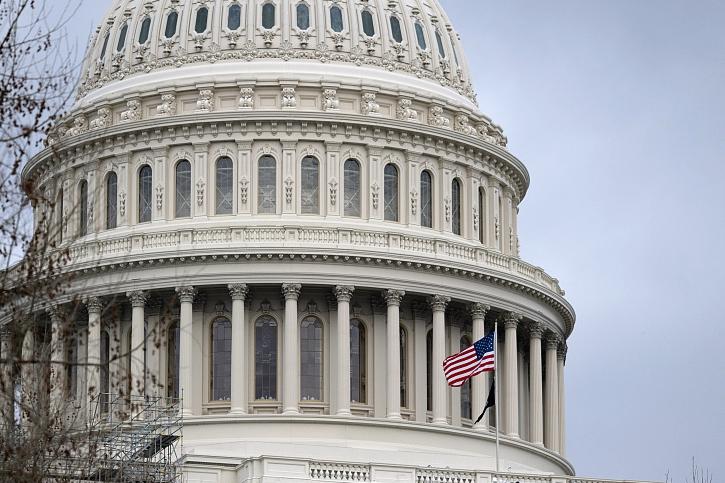?US's 'economic coercion' charge: A smokescreen of hypocrisy
- By Tom Fowdy
 0 Comment(s)
0 Comment(s) Print
Print E-mail China.org.cn, May 17, 2023
E-mail China.org.cn, May 17, 2023

A file photo of the U.S. Capitol building in Washington, D.C., the United States. [Photo/VCG]
Mainstream media outlets, including Reuters, have reported that the upcoming G7 summit in Japan will include a section targeting China, referring to its alleged "economic coercion" that purportedly "targets other countries." The United States, often in control of the G7 group's agenda, uses tactical press leaks to establish expectations, shape narratives, and pressure other members into agreement under the guise of "unity." Since 2021, the U.S. has consistently used these summits as a platform to bash China, utilizing it as an exclusive clique.
As noted above, this year's joint statement will reference China's "economic coercion." But what exactly is this? The U.S. government describes it as "threatening or actual imposition of economic costs by a state on a target with the objective of extracting a policy concession," essentially, the use of economic power to achieve foreign policy goals. Interestingly, this terminology is unique in that it is exclusively used in reference to China. Ironically, it is not employed in discussions about the crippling sanctions imposed by the U.S. and other countries, sanctions which often result in severe humanitarian consequences for the countries they target. The selective application of this term highlights the glaring hypocrisy and grotesque double standards in the U.S.'s approach to global governance.
No other country deploys economic measures in the form of unilateral sanctions more frequently than the U.S. By the end of the year 2021, the Office of Foreign Assets Control (OFAC) had imposed over 9,126 sanctions on various entities and individuals worldwide. This doesn't include the 3,000 or more imposed on Russia alone since 2023. Entire countries, such as Iran, often find themselves subject to U.S. sanctions, which operate on an extraterritorial basis using the U.S. dollar, which forces third parties to comply by threatening their access to the American market.
While the U.S. maintains that its sanctions do not target "food," "medical supplies," or "humanitarian aid," in practice, these measures block all feasible ways to transact or do business with a country, inadvertently causing humanitarian crises and food shortages in countries like Syria and Venezuela. The U.S. uses sanctions to force countries into following its political will.
Despite this, the mainstream media rarely labels U.S. sanctions as "economic coercion," a term reserved exclusively for China. Instead, American unilateral sanctions to further its national interests are portrayed as part of a "rules-based order" or "diplomacy." In other words, the U.S. has the right to devastate other countries' economies, while China is not allowed to retaliate against countries that threaten its core national interests or security. Consequentially, there is a prevalent mindset that the U.S. and its partners can sanction China, but China cannot impose even symbolic "countermeasures" in response. This highlights the fundamental inequality embedded in current international relations.
In contrast, China does not behave like the U.S. or its allies in its relations with other countries. China's foreign policy emphasizes multilateralism and equality among sovereign states. It prioritizes goodwill, engagement, and pragmatic diplomacy and does not resort to extraterritorial measures to coerce others as the U.S. dollar system does. China also refrains from forming elitist little groupings or ideological blocs, like the G7, which attempt to comprehensively force its will on others.
This contrast underscores the difference between the U.S.'s hegemonic "rules-based international order" and China's vision of an equal multipolar world. The U.S. believes it has an infinite right to use sanctions aggressively, while simultaneously accusing China of "economic coercion." This situation only highlights the hypocrisy, arrogance, double standards, and unequal nature of American unipolarity. There seems to be one rule for the U.S. and another for everyone else.
Tom Fowdy is a British political and international relations analyst and a graduate of Durham and Oxford universities. For more information please visit:
http://www.ccgp-fushun.com/opinion/TomFowdy.htm
Opinion articles reflect the views of their authors, not necessarily those of China.org.cn.





